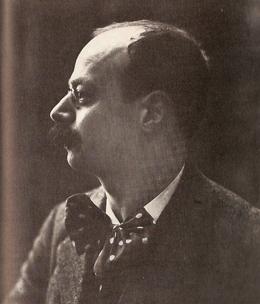English
Gabriel Alomar i Villalonga (Palma 1873 - Cairo (Egypt) 1941) was a poet, essayist and prose writer, besides his work as a teacher and politician. His poems, which are influenced by the Italian poet Giosuè Carducci, have been collected in the volume La Columna de Foc (The Column of Fire, 1911), a work that combines modernist elements – messianism and regenerationism – with others that are clearly along the lines of Noucentism – classicism and public spiritedness. His anticonservative and anticlerical ideology, however, distinguishes his style of Noucentism from that of Eugeni d'Ors.
His major work, in the form of an essay, is El futurisme (Futurism, 1905), in which he theorises on the ideals and future of his country, from a standpoint that is very different from those of his contemporaries – traditionalism, ruralism and the bourgeois perspective. Rather, he opts for a progressive, liberal form of Catalanism. Again, he goes more deeply into regenerationist thought in his essays El liberalisme català (Catalan Liberalism, 1904-1905), L'Escola filosòfica del catalanisme (The Philosophical School of Catalanism, 1907), Catalanisme socialista (Socialist Catalanism, 1910), inter alia. He also wrote on literary aesthetics in Estètica arbitrària (Arbitrary Aesthetics, 1904-1905) and De poetització (On Poetising, 1908).
He wrote for a range of daily newspapers and reviews, for example El Poble Català, La Publicitat, La Veu de Catalunya, L'Esquella de la Torratxa, Catalònia, La Nación, El Ideal, El Obrero Balear, etc.. Some of the articles he published, in both Catalan and Spanish, were collected in book form. Notable amongst these are La pena de mort (The Death Penalty, 1912), La guerra a través de un alma (War through a Soul, 1917) and El frente espiritual (The Spiritual Front, 1918). His only book of short stories, El sorbo del heroismo (The Taste of Heroism), was published in Spanish.
With an Arts and Humanities degree, he worked as a teacher in different educational institutions. As a politician, he was a clear opponent of the right-wing nationalist party La Lliga Regionalista, while defending a Catalan Nationalist form of social liberalism, which led him to found, among other political parties, the Unió Socialista de Catalunya (Socialist Union of Catalonia, 1920). In the years of the Spanish Republic he joined the diplomatic corps and in 1939, after the Civil War ended, went to live in exile in Cairo where he died in 1941. The year 2000 saw the beginning of the publication of his Obra Completa (Complete Works).
Web page: Francesc Viñas for AELC.
Translation: Julie Wark

